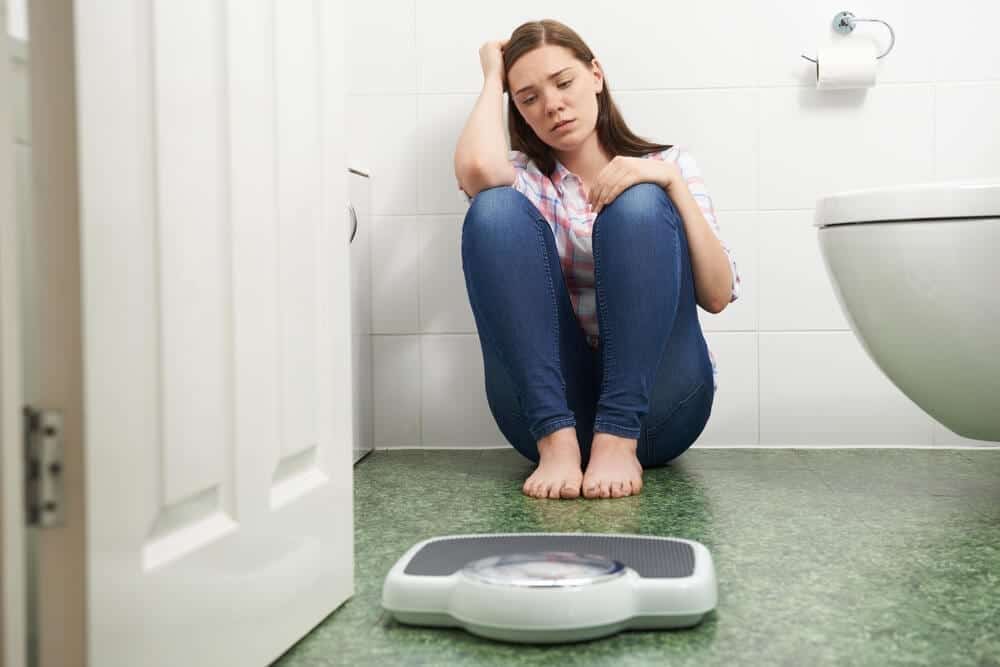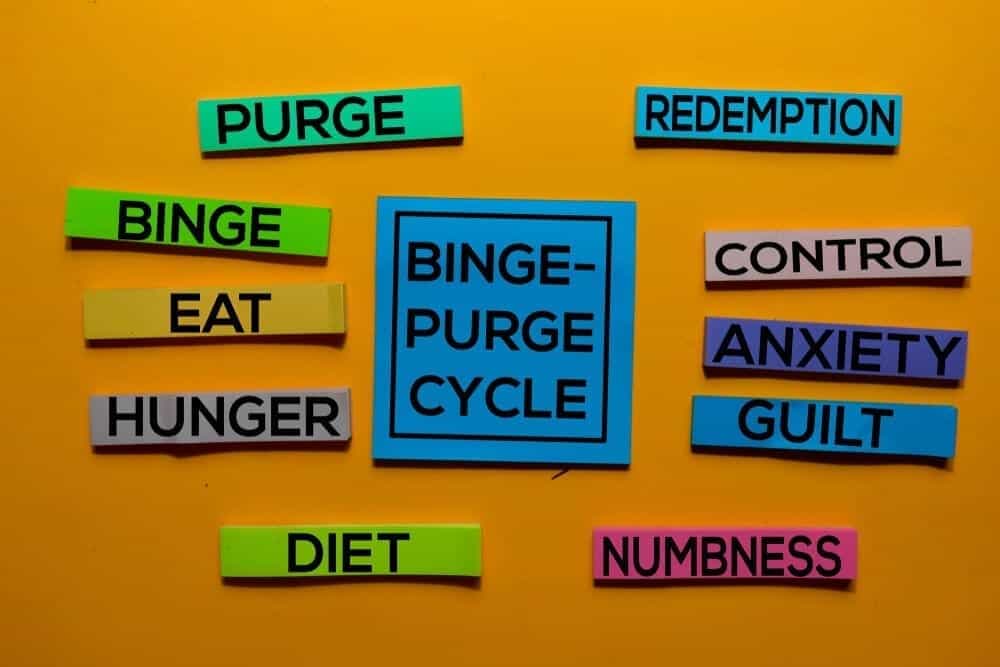Putting Purging in Your Past
If you suffer from the eating disorder known as bulimia nervosa, you may also struggle with binging and purging, or making yourself throw up or abusing laxatives or diuretics to compensate for large amounts of food consumed rapidly in a short period of time.
Or, you may have a form of eating disorder not otherwise specified (EDNOS) that is known as purging disorder, where people do not binge eat, but regularly engage in purging after eating to control their weight.
Perhaps you suspect that you have one of these eating disorders, but have not been formally diagnosed.
Regardless of what eating disorder you have (or do not have), making the decision to stop purging can be arduous. You may feel that your purging behavior is out of control or that the habit is so ingrained that it is impossible to stop. If you’ve made the decision that you’d like to stop purging, these tips will help you understand more about purging and how you can interrupt the cycle of purging.
The Dangers of Purging
If you want to stop purging, one of the most important things to understand is your motivation behind no longer purging. Purging can interrupt your quality of life by getting in the way of other activities or time spent with family and friends, but it can also have dangerous health consequences.
Some of the negative health effects of purging include, but are not limited to:
- Muscle weakness, lethargy and/or fatigue
- Dehydration and/or fluid/electrolyte imbalances
- Inability to have a bowel movement without laxatives
- Abdominal discomfort
- Broken blood vessels in the eyes
- Dental erosion or sensitivity
- Heartburn or acid reflux
- Diarrhea and/or constipation
- Damage to the esophagus, including dangerous tears
- Kidney inflammation and damage; in severe cases, renal failure
- Cardiovascular complications
- Death
As you can see, purging can take a serious toll on your health over time — and even kill you if you do not take steps to interrupt it. That’s why it’s important that you listen to your instinct to stop purging and work hard to end this behavior, even when it becomes difficult to manage.
Why Do People Purge?
When purging is so dangerous to our health, you may wonder why people engage in purging behaviors in the first place. You may have found yourself down the path of purging unsure of how you got to this point, or perhaps you are struggling to understand the behavior of a loved one with an eating disorder.
There are a number of reasons why people engage in purging behaviors, but here are some of the most common ones.
Social Purging
Especially among teenage and college-aged women, purging may be a group activity. Some social groups may normalize dieting and purging behaviors like vomiting after eating or drinking laxative teas. There may be pressure within the group to look a certain way or maintain a certain weight, or people may participate in purging because all their friends are doing it. College sororities are a common example where dieting and purging behaviors run rampant and may lead a person to engage in them when they might not have otherwise considered it. Not every person who engages in social purging will go on to develop an eating disorder, but purging is still considered a risk factor for dangerous behaviors like binge drinking and drug use.
Diet Culture
We also live in a culture that has normalized dieting — and purging, to a certain extent. Magazines and movie stars tell us that we need to look a certain way or have a certain shape or size to be considered beautiful. If you grew up watching shows like Degrassi, Beverly Hills 90210, Gossip Girl or Glee, you may have witnessed characters abusing diet pills or laxatives, or forcing themselves to throw up after meals, to live up to these standards of beauty. Many of these shows glamorize purging or decide to give a character an eating disorder that “magically” resolves within a few short episodes. Over time, these cultural messages can take a toll on us. For some people, this may result in the development of purging behaviors and/or an eating disorder.
Poor Coping Skills
Maladaptive coping mechanisms are unhelpful or risky behaviors that we developed to help us cope with negative emotions. If we experienced trauma as children that we did not know how to cope with, or if we were never taught healthy coping skills, we may develop maladaptive coping mechanisms to help us get through difficult times.
This is why many people who purge say that the behavior brings them a sense of ease or control in a period of chaos. These behaviors may be unhealthy, but they are also difficult to unlearn, given that we have often used them for long periods of time to cope. Still, with the help of a qualified professional, it is possible to develop healthier coping mechanisms to replace maladaptive ones over time.

How to Stop Purging
Purging is an unhealthy behavior for both your mind and your body. It perpetuates the eating disorder mindset and low self-esteem while wreaking havoc on your organs from the inside out. As a result, it’s important to stop purging for your overall health — and we’re here to help you do just that.
Read on to discover some ways you can interrupt the cycle of purging (and what the cycle of purging really is!) to develop healthier coping mechanisms and treat your body with more kindness and compassion.
Interrupting the Purging Cycle
If you suffer from bulimia nervosa, you may be familiar with the binge-purge cycle. You might have learned about it at a treatment center, from a therapist or even from a registered dietician. The binge-purge cycle describes a predictable pattern of thoughts and behaviors that can feel impossible to stop when you’re in the throngs of bulimia nervosa.
For people with bulimia nervosa, purging often follows an episode of binge eating. What you may not know, however, is that purging actually feeds the cycle that leads to binge eating. This cycle often begins with feelings of shame and low self-worth, leading to restriction of calories in an attempt to lose weight or change your body.
The problem with caloric restriction is that it leads to increased tension, emotions and cravings for unhealthy foods that may lend themselves to another episode of binge eating. When binge eating is followed by purging, it feeds those feelings of low self-esteem that start the cycle all over again.
The key to recovery from bulimia nervosa, then, is to interrupt this cycle by stopping purging. Here are some tips for ways to stop purging if you want to interrupt the bingeing and purging cycle in bulimia recovery:
- Eat full meals. Stopping the cycle of caloric restriction is easier said than done, but will help you interrupt the binge-purge cycle even further so that you do not get to the point where you feel the urge to binge-eat or purge.
- Identify the thoughts that precipitate purging. Purging doesn’t occur without warning. Often, we have the same or similar thoughts running through our minds every time that we are about to purge. Learning to identify those repetitive thoughts is the first step toward interrupting the cycle of bingeing and purging and deciding that you do not want to respond to those thoughts by purging.
- Make a plan to cope with the urge to purge. Purging often occurs because we have negative feelings or an urge that is so overwhelming that we don’t know how to cope with it. If you have a plan for how to cope with it, whether by distracting yourself with a fun activity or self-soothing with things you love, you can reduce the likelihood that an urge or feeling like this will end up with you purging in the end.
- Delay purging for a set period of time. If you feel a strong urge to purge, you may struggle to cope with that urge without purging at first. To make things easier for yourself, you can start by delaying purging for a set period of time — say, 10 minutes — and waiting to see if the urge passes over time. As you progress along your recovery journey, you can gradually increase the amount of time you wait to purge until you feel strong enough to resist purging altogether.
- Stop checking your weight. When you first stop purging, you may experience negative side effects like bloating that lead you to believe you’re gaining weight. In reality, most of this weight gain is due to water retention, since vomiting can dehydrate you and your body feels the need to compensate. Throw away or, heck, even destroy your scale to prevent you from letting these natural changes derail your recovery!
Developing Healthier Eating Habits
As we previously mentioned, properly nourishing your body, rather than depriving it of calories and nutrients it needs, prevents you from purging by interrupting the cycle of purging.
Professionals recommend keeping a food diary to log your food intake and any binging or purging episodes you experience during your recovery. A professional can also help you create a meal plan with three solid meals and two to three snacks per day to help you maintain a normal eating schedule, since for many people, feelings of hunger trigger the urge to binge and purge.
You should also practice mindful eating, the practice of eating with attention and intention, rather than chewing and swallowing food on autopilot. This helps you slow down and really enjoy your food, rather than going on a binge.
Our trained professionals here at The Meadowglade are skillful in providing treatment for those who want to put purging in their past. If you’re ready to stop purging, contact us today to see how we can help you recover from disordered eating behaviors and get back to living your life.

